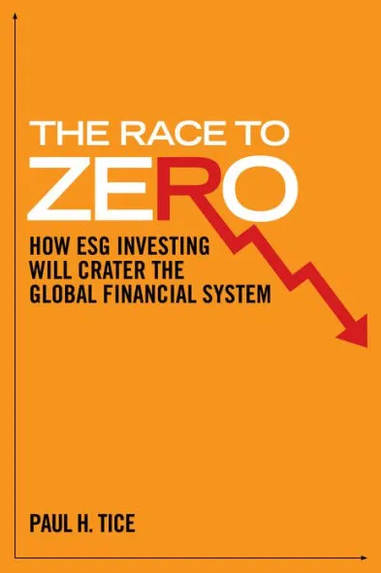|
MARCH 3, 2024
|
|
FULL TWO HOURS |
 |
|
hour 1:
"Lowering
Healthcare Costs Through Site-Neutral Policies" with Dr.
Josh Umbehr
 |
|
|
hour 2:
"THE RACE TO ZERO: How ESG Investing Will
Crater the Global Financial System - Paul
Ticen
 |
|
|
|
"Lowering
Healthcare Costs Through Site-Neutral
Policies" |

About our Guest Dr. Josh Umbehr, M.D.
FAMILY PHYSICIAN
I was born and raised in Alma, Kansas where I met my high school
sweetheart, Lisa, while playing football at Manhattan High School
and followed her to Kansas State University. While there, I majored
in human nutritional sciences with a minor in biology. I also did
extensive research on the effects of vitamin A on lung cancer. I
then graduated from The University of Kansas School of Medicine and
completed my family medicine residency at Wesley Medical Center in
Wichita. After completing training and becoming a board certified
Family Physician, I opened Atlas MD, a practice that I had been
dreaming about for nearly a decade. Atlas MD represents my ideal
medical practice where I’m able to shrug off the burdens and
restrictions of government and insurance regulation so I can focus
solely on my patients and their needs.
Lisa and I have three gorgeous children who keep us busy — Katelyn,
Paige and Cole. Katelyn, our eldest, has Down Syndrome and we’re
blessed to have her in our lives. We’ve happily made supporting the
Down Syndrome Society of Wichita a focus of ours and the clinic’s.
Personal Statement for Residency
Personal Statement for Medical School |
|
|
|
|
Privious show:
Sept 20, 2020 Show
"Direct Primary Care Doctors Reduce
Emergency Room Visits by more than 40%" |
|
|
https://www.realclearhealth.com/blog/2023/11/28/lowering_healthcare_costs_through_site-neutral_policies_995353.html |
|
|
Lowering Healthcare Costs Through
Site-Neutral Policies
By Josh Umbehr
November 28, 2023 |
|
|
The United States is facing a healthcare
affordability crisis with inflation expected
to drive costs up by 6.5 percent next year.
While Americans worry about the rising costs
of medical care, many of the underlying
causes of higher prices are overlooked. Bad
government policies, especially Medicare
reimbursement policies, foster an
environment of consolidation in the
healthcare industry, leading to higher
prices that hurt everyone. Medicare policies
must be changed to bring down costs.
Medicare accounts for almost a quarter of
all U.S. health expenditures. In addition,
Medicare covers a population with the
highest utilization rate of the healthcare
system. Individuals over 65 make up only 17
percent of the population but are
responsible for roughly 35 percent of all
healthcare spending.
The structure of Medicare requires that the
government dictate the prices it will pay as
well as the out-of-pocket co-pays patients
will have to pay. In determining these
prices, Medicare should focus on patient
care and reimburse doctors and medical
practices the same amounts for providing the
same care. However, that is not how the
system operates today.
Medicare bases their reimbursement amount on
the “type” of provider, but that many of
these off-campus HOPDs look more like a
regular doctor’s office. So, when a patient
receives medical services from a facility
owned by a hospital, Medicare reimburses at
a higher rate than if the service was
provided at a private practice.
This dual reimbursement rate creates an
unintended incentive: If a hospital can buy
a private medical practice, it will be
considered part of its outpatient
department, and Medicare will pay higher
reimbursement rates than its physician-owned
competitors. Consolidation within the
healthcare industry is a sad consequence of
these policies.
A report to Congress on Medicare found that
"in recent years, the number of services
billed in HOPDs (Hospital Outpatient
Departments) has been increasing, while the
number of services provided in freestanding
offices has been declining.” And researchers
from Harvard University report that
“consolidation of healthcare entities and
services is a key driver of higher prices
and tends to reduce rather than increase
patient satisfaction." When hospitals buy
smaller competitors, there is less
competition, and the hospital gains market
power. More market power enables hospitals
to raise prices without competitors and
market forces to check them.
Congress should mandate that Medicare
implement site-neutral reimbursements that
would require payments of the same amount
regardless of where the service is provided
and whether a hospital owns a physician
practice. Site-neutral payments would remove
the incentive for hospitals to buy small
practices and help keep healthcare costs
from rising. The Medicare Payment Advisory
Commission (MedPAC), an independent and
non-partisan commission established by
Congress to advise legislators on Medicare
issues, recommended in its June annual
report that Congress adopt site-neutral
payments “because of the recent growth in
hospital acquisition of physician practices
and our own empirical analysis.”
MedPAC expects site-neutral payments over
time would decrease Medicare spending
“because it would reduce incentives for
hospitals to acquire physician practices and
bill for services under the usually
higher-paying [outpatient provider fees].”
It also anticipates Medicare beneficiaries
would be better off under site neutrality,
noting that “beneficiaries would incur lower
cost-sharing liability for site-neutral
services, and we expect that they would
continue to have access to the services.”
A 2023 study estimates that a site-neutral
policy would result in $231 billion in
savings for the federal government over a
decade and another $152 billion in savings
for patients paying out-of-pocket costs.
Fairness in Medicare pricing and lower
out-of-pocket costs for seniors and all
Americans is a bipartisan issue.
Site-neutral payments are a common-sense
solution. There is no reason for Congress to
hesitate to pass such vital reforms.
Dr. Josh Umbehr, M.D. is a Family Medicine
Specialist in Wichita, KS. |
|
|
|
|
Hour 2: "THE RACE TO ZERO: How ESG
Investing Will Crater the Global Financial
System" with Paul Tice
 |
|
|
 THE
RACE TO ZERO:
How ESG Investing Will Crater the Global
Financial System THE
RACE TO ZERO:
How ESG Investing Will Crater the Global
Financial System
Over the past few years, so-called
“sustainable investing”—a new practice based
on the theory that environmental, social,
and governance (or “ESG”) factors should
drive corporate policy and investment
decisions—has swept across Wall Street.
Spurred on by the United Nations, national
governments, and financial regulators, and
cheered on by academics, environmental
activists, and the media, the ESG orthodoxy
has received little public resistance as it
has integrated itself into almost every
corner of the financial sector. By 2030, the
iron curtain of sustainability will have
fully cast its shadow across Wall Street.
The Race to Zero provides a detailed
rebuttal to the case for sustainable
investing from the perspective of a
long-time Wall Street analyst, investor, and
latter-day finance professor. Sustainable
investing does not aim to generate excess
returns for investors or to further ethical
goals such as improving society or saving
the planet; rather, it seeks to seize
control of the world’s financial system in
order to ensure that the allocation of
capital and investments across markets is
politically favorable to establishment
interests.
By limiting financial market access, ESG is
designed to create a compliant corporate
sector to serve as both Greek chorus and
funding source for the environmental and
social causes championed by government and
the elite class. Climate change is its
driving force and priority goal, and its
main targets are fossil fuel companies
operating in the industrialized Western
world. This book is designed to expose these
truths in plain-spoken language—free of
financial jargon—to reach the widest
possible audience, including the silent
majority on Wall Street that is now afraid
to speak up about ESG. |
|
|
About our
Guest Paul Tice
Paul H. Tice is an Adjunct Professor
of Finance at the Leonard N. Stern School of
Business at New York University, where he
teaches mainly on the energy, infrastructure
and project finance markets. Mr. Tice has
been a frequent guest lecturer, panel
speaker and case study/research author at
NYU Stern since 2013 and served as an
Executive-in-Residence at the school from
2015-2017. He also regularly contributes
Op-Ed pieces on energy- and finance-related
topics to The Wall Street Journal, The Hill
and other news media.
Mr. Tice has worked on Wall Street for the
past three decades and is a 29-year veteran
of the fixed income and credit markets,
spanning investment grade, high yield,
emerging markets, middle market lending and
private/illiquid credit, including
stressed/distressed/special situations. For
the last 23 years, he has specialized in the
energy and infrastructure sector, both as a
top-quartile buy-side portfolio/investment
manager and as a top-ranked sell-side
research analyst.
Mr. Tice currently works at Schroder
Investment Management, where he is a Senior
Investment Manager and heads up energy
sector credit research for the firm’s global
fixed income business. Prior to joining
Schroders in August 2017, he was a Senior
Managing Director and Head of the Energy
Capital Group in the asset management
division of U.S. Capital Advisors, an
energy-focused financial services boutique.
Prior to joining U.S. Capital Advisors in
2015, he worked at BlackRock, where he was
the Head of private energy investments for
the firm’s Credit platform and Americas
Fixed Income business, while also serving as
the Lead Portfolio Manager for the Energy
Strategy book within BlackRock’s R3 Fund.
Prior to joining BlackRock in 2009, Mr. Tice
was the Chief Operating Officer, Co-Chief
Investment Officer and a Senior Partner of
R3 Capital Management, a multi-strategy,
credit-focused hedge fund manager that was
spun out of Lehman Brothers in May 2008 and
subsequently acquired by BlackRock in April
2009.
Prior to R3 Capital Management, Mr. Tice
worked for a total of 14 years at Lehman
Brothers (2002-2008, 1989-1997) in a variety
of roles, most recently as a Managing
Director in the firm’s Global Principal
Strategies (GPS) division, an internal,
credit-focused proprietary fund that was
formed in June 2006 and spun out in May
2008. While at GPS, Mr. Tice supervised the
fund’s investments in the energy and power
sector, while also managing the overall GPS
research effort and approving all private
equity and longer-term investments by the
fund.
Prior to joining the GPS group in 2006, Mr.
Tice spent 17 years in sell-side credit
research, both at Lehman Brothers and
Deutsche Bank/Bankers Trust (1997-2002),
where he mainly covered the energy sector,
both as a senior analyst and a producing
manager.
Mr. Tice has covered the energy sector since
1995 and was one of the top-ranked
Investment Grade Energy analysts over
1995-2006. In 2006 and 1998, he was the #1
ranked Investment Grade Energy analyst on
Institutional Investor’s All-America Fixed
Income Research Team. Prior to originally
joining Lehman Brothers in 1989, Mr. Tice
was a senior financial analyst at JPMorgan
Chase.
Mr. Tice has previously served on the Board
of Directors for Lightfoot Capital Partners
GP LLC, International Resource Partners GP
LLC, Arc Terminals GP LLC, Crown Oil
Partners IV, LP and Richland-Stryker
Investment LLC, all of which were investment
portfolio companies of the R3 Fund.
Mr. Tice earned a BA degree in English,
magna cum laude, from Columbia University in
1983, and an MBA degree in Finance from the
Leonard N. Stern School of Business at New
York University in 1988. He is a member of
Phi Beta Kappa.
Courses Taught
-
FINC-GB.3186, Project Finance and
Infrastructure Investment
Academic
Background
MBA, Finance, 1988
NYU Stern School of Business
BA, English, 1983
Columbia University
Selected Publications
Paul H. Tice (2016)
In Remembrance of Lehman Brothers
Paul H. Tice (2014)
How Climate Change Conquered the American
Campus |
|
|
|
|
|
|